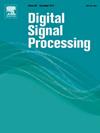多通道压缩采样系统的联合盲校正
IF 3
3区 工程技术
Q2 ENGINEERING, ELECTRICAL & ELECTRONIC
引用次数: 0
摘要
随着雷达和通信系统的快速发展,多通道压缩采样架构已经成为高频和宽带信号采集的关键解决方案。然而,实际实现中不可避免地会受到非理想因素的困扰,特别是未知增益相位误差和信道间互耦,严重降低了信号重建的精度。现有的校准方法主要集中在阵列流形或依赖于先验知识,往往被证明不足以解决压缩采样系统中不同的测量矩阵结构。为了解决这一限制,我们提出了一种联合盲校准框架,可以在多通道压缩采样系统中同时实现稀疏信号恢复和系统误差校正,从而消除了对专用测试信号或辅助校准设备的需求。我们将联合标定问题重新表述为一个多线性反问题,并将其进一步转化为一个可通过双投影梯度下降算法求解的特征向量/特征值优化任务。本文的主要工作是对所提出的特征向量求解问题的特征值分布范围和摄动界进行理论分析。这些分析表明,特征值间隙由相互耦合衰减系数控制,保证了算法在实际噪声条件下的收敛性。大量的数值实验验证了该方法的优越性。值得注意的是,相互耦合效应的理论边界与实证结果密切一致,证明了框架的可靠性。本文章由计算机程序翻译,如有差异,请以英文原文为准。
Joint blind calibration for multichannel compressed sampling systems
With the rapid advancement of radar and communication systems, multichannel compressed sampling architectures have emerged as a pivotal solution for high-frequency and wideband signal acquisition. However, practical implementations are inevitably plagued by non-ideal factors, particularly unknown gain-phase errors and inter-channel mutual coupling, which severely degrade signal reconstruction accuracy. Existing calibration methods primarily focus on array manifolds or depend on prior knowledge, often proving inadequate for addressing the distinct measurement matrix structures in compressed sampling systems. To address this limitation, we propose a joint blind calibration framework that enables simultaneous sparse signal recovery and system error correction in multichannel compressed sampling systems, eliminating the need for dedicated test signals or auxiliary calibration equipment. We reformulated the joint calibration problem as a multilinear inverse problem, which is further transformed into an eigenvector/eigenvalue optimization task solvable via a dual-projection gradient descent algorithm. The main work of this paper lies in providing a theoretical analysis of eigenvalue distribution ranges and perturbation bounds for proposed eigenvector-solving problem. These analyses reveal that the eigenvalue gap is governed by mutual coupling attenuation coefficients, ensuring algorithmic convergence under practical noise conditions. Extensive numerical experiments validate the method's superiority. Notably, the theoretical bounds on mutual coupling effects align closely with empirical results, demonstrating the framework's reliability.
求助全文
通过发布文献求助,成功后即可免费获取论文全文。
去求助
来源期刊

Digital Signal Processing
工程技术-工程:电子与电气
CiteScore
5.30
自引率
17.20%
发文量
435
审稿时长
66 days
期刊介绍:
Digital Signal Processing: A Review Journal is one of the oldest and most established journals in the field of signal processing yet it aims to be the most innovative. The Journal invites top quality research articles at the frontiers of research in all aspects of signal processing. Our objective is to provide a platform for the publication of ground-breaking research in signal processing with both academic and industrial appeal.
The journal has a special emphasis on statistical signal processing methodology such as Bayesian signal processing, and encourages articles on emerging applications of signal processing such as:
• big data• machine learning• internet of things• information security• systems biology and computational biology,• financial time series analysis,• autonomous vehicles,• quantum computing,• neuromorphic engineering,• human-computer interaction and intelligent user interfaces,• environmental signal processing,• geophysical signal processing including seismic signal processing,• chemioinformatics and bioinformatics,• audio, visual and performance arts,• disaster management and prevention,• renewable energy,
 求助内容:
求助内容: 应助结果提醒方式:
应助结果提醒方式:


